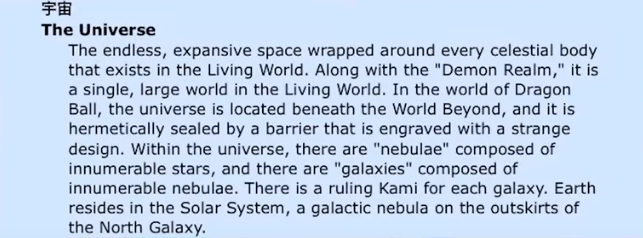Selective reading and selective blindness. He lays two options and then goes on to say that Daizenshuu uses the interpretation where there are only 4 galaxies. He goes on to list that is is mentioned a total of 2 times in Daizenshuu 7 and 2 other times in other guides.
Lack of reading comprehension.
1. He uses galaxy/galaxies interchangeably only where it is not clear whether it is meant in plural or singular. When it is clear by the context, he uses only one of those.
2. He also says which possibility the Daizenshuu follows.
3. The "open to interpretation" part is referring to the claim that the galaxies exist infinitely.
He is claiming very objectively Daizenshuu uses the interpretation where there are only 4 galaxies. He goes on to list that is is mentioned a total of 2 times in Daizenshuu 7 and 2 other times in other guides.
Whenever japanese use plurals, they are usually either preceded with a number and a
counter, or simply made understood through context.
"The universe has ginga"
It can be translated as "the universe has galaxy" or "the universe has galaxies". A bit ambiguous but context would say that most of the times it is used as plural in this case.
"One ginga"
Since there is a number, it can only be translated as "one galaxy". Not "one galaxies".
"Few ginga"
Once again, there is a number/counter, so it can only be translated as "few galaxies". Not "few galaxy".
No, galaxy/galaxies cannot be used interchangeably all of the time. Many times the context only allows you to use either singular or plural. The language is not so vague where you can pick and choose what you want to use at any given time.
Let's look at the two statements from Daizenshuu 7 now.
"There is a ruling Kami for EACH ginga"
Since the word "each" is there, it cannot be translated as "there is a ruling Kami for each galaxies". Ginga is used as a singular here, since "each" refers to one. There are no two ways about it. No interchangeability. It is clearly defined through context that ginga in this case is singular.
Which means "there is a ruling Kami for each galaxy". Which ultimately means Daizenshuu says there are 4 galaxies.
EACH
GALAXY
There are 4 Kami.
One for
EACH GALAXY.
Hence,
4
GALAXIES.
"The universe is divided into FOUR ginga"
Since a counter 4 is present here, ginga can only be translated as galaxies. It cannot be translated as "the universe is divided into 4 galaxy". It blatantly says "the universe is divided into 4 galaxies".
There are no two ways to interpret this. 4 means 4. Galaxies means galaxies. The universe is divided into 4 galaxies.
Not 4 groups of galaxies.
ONLY
4
GALAXIES.
And galaxies do not contain more galaxies in it. According to the daizenshuu, they contain nebulae and planets.
Which is what Herms has confirmed not once
Not twice.
But thrice.
And maybe more times.
These are the two instances from Daizenshuu 7 he is talking about where it is blatantly said that the universe has 4 galaxies. And there are more instances in other guides.




